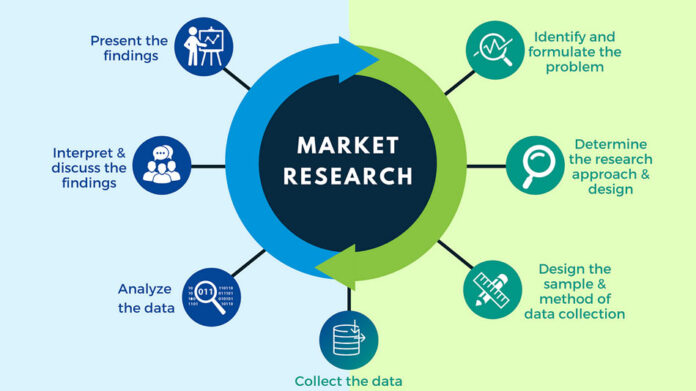Table of Contents
In today’s fast-paced and interconnected global economy, businesses face an ever-evolving landscape rife with challenges and opportunities. The journey toward enduring success is no longer a linear path; it requires a multifaceted approach that encompasses a profound understanding of consumer behaviors, market dynamics, and emerging trends.
In the comprehensive guide on market research techniques for business success, we explore how employing a check stub maker can simplify payroll management while companies focus on gaining invaluable consumer insights and strategic growth. The strategic utilization of market research techniques has emerged as an indispensable tool for modern enterprises seeking to not only survive but thrive in this dynamic environment.
This comprehensive exploration delves into an extensive array of market research techniques, unraveling their intricate layers and demonstrating how they collectively empower businesses to unearth invaluable insights that steer them toward a future of sustainable growth and innovation.
The Strategic Imperative of Market Research
Market research is the compass that guides businesses through the complex maze of consumer preferences, competitive forces, and industry trends. It holds the potential to unlock a realm of possibilities, enabling organizations to:
Decode Consumer Preferences:
In an era characterized by personalized experiences, market research serves as a window into the minds of consumers. By peering into their preferences, pain points, and desires, businesses can tailor their offerings to create solutions that truly resonate.
Anticipate Market Shifts:
As markets evolve, the ability to anticipate shifts becomes paramount. Market research equips businesses with the foresight to detect emerging trends, thus enabling them to proactively adapt their strategies and maintain a competitive edge.
Refine Marketing Strategies:
In the cacophony of modern marketing, precision is key. Market research provides businesses with insights into consumer behaviors and responses, enabling the optimization of marketing strategies for maximum impact and engagement.
Navigate Uncertainty with Confidence:
The business landscape is replete with uncertainties. Market research serves as a shield against the unknown by highlighting potential risks and opportunities, thereby guiding sound decision-making.
Fuel Product Innovation:
The birth of innovation is often rooted in the unmet needs of consumers. Market research unveils these needs, allowing businesses to craft products and services that align seamlessly with customer expectations.
Unveiling an Arsenal of Market Research Techniques
Surveys and Questionnaires:
Surveys and questionnaires are workhorses of market research, providing a quantitative lens into consumer opinions. Crafted thoughtfully, these tools capture a wide spectrum of data, ranging from preferences and opinions to satisfaction levels. With the proliferation of online survey platforms, businesses can tap into a global audience with ease, while in-person surveys offer the intimacy required for in-depth insights.
Focus Groups:
Delving deeper into the human psyche, focus groups assemble a diverse cohort to engage in structured discussions about specific topics or products. This qualitative approach uncovers layers of consumer perceptions, motivations, and emotions that quantitative methods might overlook.
Competitive Analysis:
The battlefield of business demands an understanding of rivals. Competitive analysis dissects competitors’ strategies, strengths, weaknesses, and market positions, revealing opportunities for differentiation and refinement.
Social Media Listening and Analysis:
Social media has transformed into a virtual agora of conversations. Social media listening entails tracking and analyzing online discourse, unraveling sentiment, identifying trends, and gauging brand mentions. The application of sentiment analysis tools adds a layer of emotional nuance, enabling businesses to fine-tune their strategies in real time.
Data Analytics:
The era of big data heralds a new dawn for market research. Data analytics entails the exploration of voluminous datasets to extract patterns, correlations, and insights. By mining data from diverse sources, businesses can make informed predictions, gain a deeper understanding of consumer behavior, and shape their strategies accordingly. Businesses can also conduct market research by utilizing something like this Conjoint analysis example Excel file and analyzing data from gathered insights around customer preferences and desires.
Observational Research:
Stepping into the shoes of consumers, observational research involves firsthand observation of real-world consumer behavior. It provides unfiltered insights into interactions with products, decision-making processes, and navigation experiences, offering a unique perspective to enhance products and services.
Crafting a Holistic Market Research Strategy
The blueprint for an effective market research strategy entails a systematic and purposeful approach:
Crystalize Objectives:
Begin by defining clear and concise research objectives. Determine whether you seek to unveil consumer preferences, assess the viability of a product concept, or evaluate the impact of a marketing campaign.
Select Techniques Strategically:
ailor your approach by selecting market research techniques that align with your objectives. A combination of quantitative and qualitative methods often yields a comprehensive perspective.
Develop Effective Instruments:
Craft well-designed surveys, questionnaires, or discussion guides that seamlessly align with your research objectives. Ensuring clarity, neutrality, and relevance is paramount to yielding actionable insights.
Gather Data Purposefully:
Implement chosen techniques to amass data from your target audience. Utilize online tools, engage in focus group sessions, deploy surveys, and leverage data analytics platforms to curate a comprehensive dataset.
Analyze with Rigor:
Employ robust data analysis techniques to discern patterns, trends, and insights. Whether through statistical analyses or qualitative interpretation, the goal is to extract meaning from the collected data.
Illuminate Conclusions and Recommendations:
Synthesize the analyzed data to draw conclusive insights. Translate these insights into actionable recommendations that underpin informed decisions and strategic directions.
Application and Iteration:
Infuse the insights garnered from market research into the fabric of your business. Continuously iterate, adapt, and optimize strategies based on real-time feedback and evolving market dynamics.
Eternal Vigilance:
Market research is a continuous journey, not a finite destination. Perpetually monitor market trends, shifts in consumer behavior, and the competitive landscape to remain agile and responsive.
A Prologue for Prosperity
Market research is the key that unlocks a realm of possibilities for businesses aiming to carve a lasting legacy. By synthesizing a diverse repertoire of market research techniques, enterprises gain unparalleled insights into the minds of their target audience, the intricacies of competition, and the pulse of the industry. With these insights as their North Star, organizations navigate the ever-changing landscape of business with clarity and conviction.
The journey of market research is an ongoing odyssey, a perpetual quest that empowers businesses to thrive, evolve, and cater adeptly to the evolving needs of their clientele. In a world where information reigns supreme, market research stands as the cornerstone of a future characterized by sustained growth, unbridled innovation, and resounding triumph.















